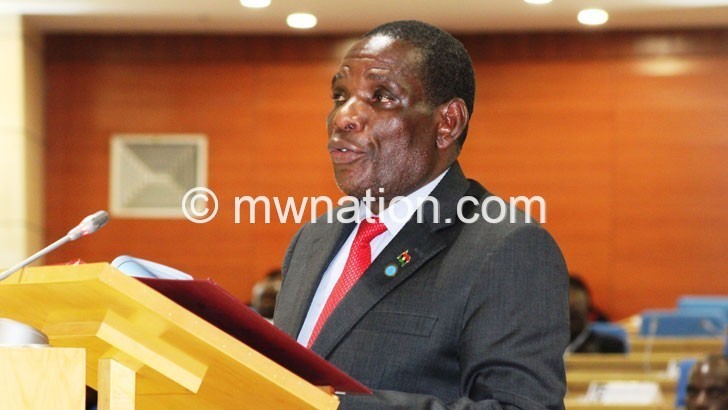Committee, opposition doubt budget assumptions
The Budget and Finance Committee of Parliament and opposition spokespersons on Finance yesterday took turns to tear into the proposed K1.99 trillion 2021/22 National Budget, casting doubt on Treasury’s ability to attain embedded assumptions.
Minister of Finance Felix Mlusu presented the Budget Statement in Parliament on May 28 2021, formulated under several assumptions, including a projected real gross domestic product (GDP) growth rates of 3.8 percent in 2021 and 5.4 percent in 2022; an average inflation rate of 7.4 percent during the fiscal year and a stable exchange rate of about K780 against the dollar.
But Budget and Finance Committee of Parliament chairperson Gladys Ganda told Parliament that given the impact of the Covid-19 pandemic on the economy, it will be hard to attain such projections.

She said: “For example, the local currency has been depreciating from K714 to a dollar in May 2020 to K800 a dollar in May this year. The committee has no choice but to question the low inflation projections given by the minister.”
Ganda said the committee’s analysis of the 2020/21 revised estimates against the 2021/22 proposed estimates reveal that domestic revenue will decrease by 7.16 percent, which implies that government would have only collected about 7.16 percent in the last quarter to reach the 2020/21 revised estimate.
The committee chairperson said they are sceptical if this projection will turn into a reality.
She said: “In fact, a comparison of the proposed 2021/22 estimate of K1 271 trillion and the 2020/21 adjusted revised estimate of K1 142 trillion reveals that domestic revenues have increased by 11.27 percent.
“This means that domestic revenue will only cover 55.34 percent of the total expenditure, which will inevitably lead to more borrowing to cater for the deficit; hence, increasing stress to the country’s ever growing debt”.
Ganda advised government to stick to the statutory limits of borrowing as stipulated in the Public Finance Management Act and the Reserve Bank of Malawi Act.
She argued that any intention to depart from the principles of prudent fiscal management should be brought to the attention of the National Assembly prior to commitment by the Ministry of Finance.
On his part, Democratic Progressive Party (DPP) spokesperson on finance Joseph Mwanamvekha described the proposed budget as consumptive, unrealistic, debt ridden, unfriendly to the private sector and not aligned to government’s national development plan, the Malawi 2063 Vision.
He said the budget is consumptive because 71 percent of the funds is allocated towards recurrent expenditure while only 29 percent is for development.
Said Mwanamvekha:: “This budget is unrealistic because the projected exchange rate of K780 to the US dollar is unachievable. As we speak, the Malawi kwacha is trading over K800 to the US dollar on the official market, while trading at over K900 to the US dollar on the parallel market.”
Mwanamvekha, who served as minister of Finance in the immediate past Mutharika administration, further said the huge and unprecedented deficit of K811.7 billion in the just ending fiscal year and K718.3 billion projected in 2021/22 fiscal year makes the budget debt-ridden and unfriendly to business.
“These levels of debt are too high to the extent that the private sector will be crowded out hence leading to high interest rates,” he said.
The former finance minister argued that the budget was also not aligned to the Malawi 2063 Vision because only 16.5 percent has been allocated to its three key pillars, namely agriculture productivity and commercialisation; urbanisation and industrialisation.
On his part, United Democratic Front spokesperson on finance Ismail Mkumba said the budget was presented at a time when Malawians are bitter about growing economic hardships and broken campaign promises.
He said the scope of demands on the State has grown unanimously and consistently as people’s expectations are not being met.
Said Mkumba: “We must admit that indeed ‘Pa Ground Patelera’. Life is rather tough and getting even tougher for the ordinary Malawian.
“To make things worse, this is happening at a time when Malawians are witnessing those connected to the top brasses suddenly becoming as rich as kings overnight, with rumours of continued massive corruption and plunder of State resources.”
He said government continues to face significant challenges in the ongoing change process amid recent abuse of Covid-19 funds, the emerging National Oil Company of Malawi fuel scandal where some $50 million is being fought over by the two critical sides in the Tonse administration.
“These scandals are in the public interest. May I request that they be thoroughly investigated by the Anti-Corruption Bureau and if need be, decisive action must be taken,” said Mkumba.
The proposed 2021/22 National Budget has a deficit of K718.3 billion, which is seven percent of GDP compared to the K811 billion fiscal gap or 8.8 percent of GDP in the 2020/21 fiscal year.
Mlusu said the deficit will be financed through foreign borrowing amounting to K134.8 billion and domestic borrowing amounting to K583.5 billion, or 5.7percent of the GDP.





